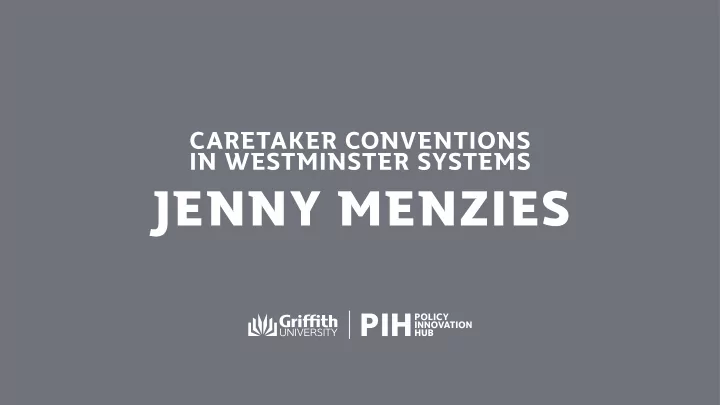

CARETAKER CONVENTIONS IN WESTMINSTER SYSTEMS JENNY MENZIES
CONVENTIONS Conventions on how government works are not written down in the Constitution but can have a great impact. Apply to: • Cabinet government • Relations between the Crown and the Parliament • Between the houses of Parliament • Ceremonial etiquette and protocols Characteristics: • They start as precedents which give rise to binding rules of behaviour • They are not subject to judicial interpretation or enforceable through the legal system • To continue, they must be observed by both sides of Parliament and are reciprocal with a change of government
PRINCIPLES OF CARETAKER CONVENTIONS • With the dissolution of the House, there is no popular chamber to which the Executive government can be responsible; and • Every general election brings with it the possibility of a change of Operationalised as: • The business of government continues and ordinary matters of administration can proceed; and • Signifjcant decisions should not be made which would bind an incoming government and limit its freedom of action
THE PUBLIC SECTOR’S ROLE • The conventions ensure someone has hold of the formal levers of power until a new government is formed • Prime Ministers and Premiers are the fjnal arbiters of the application of caretaker conventions but adjudication increasingly in the hands of senior offjcials • They are outlined in Chapter 9 of the Cabinet Handbook
YOUR PROFESSIONAL OBLIGATIONS • Remember every election brings a potential change of government • Electoral volatility makes that more of a possibility • Hyperpartisanship increases the risk for the public service • Public Service Act 2008 “carrying out duties impartially and with integrity’ Questions and discussion
CONTROVERSIES • Posting of ministerial press releases and transcripts on departmental websites • Pre-election consultation and request from the Opposition for briefjng • Government appointments • Policy announcements during the election campaign • Government advertising • Grants
THE 2012 QUEENSLAND STATE ELECTION Political issues: • When would the conventions apply from • Appointment of the Crime and Misconduct Commission head • Free public transport Bureaucratic issues: • Communication’s campaigns • Technical issues and Executive Council • Use of government facilities • Responding to the Flood Commission of Inquiry Report
TUGAN BY-PASS For discussion: • What were the issues highlighted by the Tugun by-pass case? • What were the implications for public servants interpreting conventions in a heated political environment? • How might the controversy have been avoided? • What were the lessons for Queensland public servants and other government decision-makers?
CHALLENGES IN APPLICATION • The emergence of the political offjce and the desire to maximise political advantage during election campaigns • Rise of executive power and the move away from Parliamentary accountability • Long term incumbency and the challenges of managing these relationships • Loss of ‘crafu’ skills and the capacity to apply precedent and judgement • Emergence of new issues, such as the internet, and formulating new responses on how to deal with them
LENGTHY TRANSITIONS • Caretaker period ends when a new government is formed • In the event of a hung Parliament, this could take a number of weeks • Need for continuity of administration • Increased chance of crisis and the need for bi-partisan decision-making
JUDGMENT • Application relies on judgment, knowledge of precedents and a desire to see the continuation and upholding of the convention • However, interpretation is inevitably subjective, situational and context dependent • But the management of them ultimately falls to senior offjcials to apply the caretaker principles and defend such judgments in the contested atmosphere of an election campaign Questions and discussion
Recommend
More recommend